View this page in: ไทย
CASE STUDY
The Executioner Behead a Prisoner
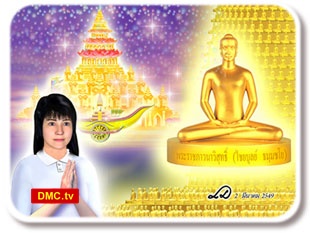
With great respect to Luang Phaw.
I am an undisputedly devoted student of the Dream in Dream Kindergarten. I never refuse any kind of merit. I watch DMC everyday and enjoy listening to case studies very much. The more I listen, the more I want to make merit. I do not wish to act badly in the slightest manner. I want everyone to love merit and fear sin. So I have respectfully submitted my case study to Luang Phaw for the benefit of Dream in Dream Kindergarten students around the world.
My father was a direct descendent of Prince Pinklao, the younger brother of King Mongkut (King Rama IV). He was bestowed with powers equal to those of the King. Some people called him “The Second Ruler of Thailand” but common people called him “Wang Na” (“Crown Prince”).
My father was officially the grandson of Prince Pinklao. His title was “Mom Chao” (“Serene Highness”) from birth. Even though he had a comfortable life inside the palace walls, he was a direct and honest man. He was not deceitful or corrupt. Thus he was the poorest Mom Chao among the descendents of Prince Pinklao. His situation resembled that of a poor person in a wealthy community.
He took a position as a civil servant in the Department of Prisons, Ministry of Interior. His rank was similar to that of a director of a department in the present day. He controlled and administered the prison system. He was in charge of incarcerating and punishing criminals, including the supervision of prisoner executions. In that era, the executioner used a sword to cut off the head of the prisoner. In 1934, the execution method changed to be by firing squad.
When he received a command to execute a prisoner, my father’s duty was to ensure the execution proceeded smoothly. He started by giving the person to be executed delicious food as a last meal.He would have monks come to give sermons for the inmate to hear. Then he would have the inmate placed in chains then lead the inmate to the execution post. The inmate would sit with his legs straight on banana leaves, with his back against the post.
The inmate would have his upper-arms tied to the post. His wrists would be bound together in a gesture of prayer. A candle, incense, and flowers would be placed between his hands. His eyes were blindfolded. The executioner wore a short-sleeve shirt and long red trousers embroidered with sacred mantras sanctified by holy men. The executioner placed a crown on his own head in the style of a Thai-style boxer. The belief was that all these things would protect the executioner from the angry spirit of the prisoner.
There were 3 executioners: the primary swordsman, along with the second and third swordsmen in reserve. Before raising the sword, the executioner would ask forgiveness of the person sentenced to death. Then he would take red paste and rub it around the inmate’s neck to delineate the area where the sword would strike.The executioner would take clay, make an incantation, then place the clay in the prisoner’s ears and mouth. Then the second and third swordsmen would dance around the prisoner in time with the rhythm of a drum and flute. When the prisoner’s mind was calm, the primary executioner would cut off the prisoner’s head. If the primary swordsman’s first blow did not sever the neck, the second swordsman would strike the neck again. If the second blow failed, the third swordsman would continue until the neck was fully severed.
Then the executioner would cut off the prisoner’s heel in order to remove the chains. This was the end of the rite. There was once a case where a prisoner was sentenced to death for killing his own child. Before the execution, the primary swordsman drank a large amount of alcohol to calm himself. Just when he was about to make the killing blow, his energy level dropped greatly until he was unable to sever the prisoner’s neck immediately. The primary swordsman lost his footing because he struck his blow at the wrong moment. So he ended up obstructing the path of the second swordsman who was raising his sword to administer a follow-up blow.
My father was standing quite close to the execution area. He quickly stepped forward to help. He used the end of his foot to kick the primary swordsman out of the arc of the second swordsman’s blow. Then the second swordsman successfully severed the neck. But the blood from the severed neck gushed out all over my father from head to toe. But all this was still fortunate because the severed neck could have belonged to the primary swordsman, not the prisoner.
At the end of his life, my father was happy with himself. When he was 59 years old, he died peacefully in his sleep. He was not sick before his death and he did not have any last requests. My mother was born in Chaiyaphum Province. When she was 9 years old, she was plucked from her life as a commoner and became a courtesan. Her older brother knew a high-ranking official, a Mom Chao in the Tha Chang Royal Palace.
So he placed my mother under this official’s care. The official showed compassion by accepting my mother into his care in the palace. He supported her studies until she graduated from sixth grade.When she had grown to be a young woman, she was attractive. She was much in demand by young men. She was even especially admired by the Mom Chao who had supported her.
In the end, she married the Mom Chao, becoming his third wife. Their ages were about 24 years apart. They had 4 children, 3 sons and one daughter. I was the daughter, the youngest child. I was only 1 ½ years old when my father died. My mother taught all the children not to consider themselves as members of the royal family and not to act haughtily. She taught us to be the opposite, to be down-to-earth, deferential, and humble.
After my father’s death, his first wife had us choose between staying in the palace or receiving an inheritance and leaving the palace. Due to the devotion she had for my father, she decided to remain at the palace. But our lives were not comfortable as they had been before. My father’s first wife only supported us with basic necessities. Our other expenses were my mother’s responsibility.
My mother was an excellent Thai food chef, having studied in the palace since her childhood. She decided to be the chef at a Thai restaurant catering to foreigners. Her expertise was valuable for this work. She had many opportunities to prepare food that was offered to the former Supreme Patriarch (head of the Buddhist monastic order in Thailand) who stayed at Ratchabophit Sathitmahasimaram Ratchaworawihan Temple. When my mother was 60, she became ill with emphysema. At first, everyone thought that it was because she had smoked hand-rolled cigarettes for many years in the past.
But unbelievably, a doctor discovered that her illness came from inhaling the oil droplets that she produced while cooking large amounts of fried rice noodles everyday. The oil entered her lungs and accumulated until she had problems breathing.
Her condition continually worsened until she passed away at the age of 70. I always reminded her of the merit she had made during her life. Once when she was sick, she had her first x-ray at Bhumibol Adulyadej Hospital. Something strange occurred.Normally my mother did not remove her stainless steel necklace which had amulets hanging from it.When the doctor looked at the film, one of her 3 amulets showed a Phra Dhammakaya sitting in a meditation posture very clearly.The other 2 amulets were completely black and we could only see the outline of their shapes.
The doctor asked what amulet it was. I replied immediately that the one amulet which showed up clearly was a gift amulet from Wat Phra Dhammakaya Temple. The other 2 amulets came from other temples.The doctor looked surprised and confused. He said this was strange. I was truly amazed. The amulet was part of the first set of gift amulets from Wat Phra Dhammakaya. One side showed Phra Dhammakaya and the opposite site showed Luang Pu.We should not have seen the image of the amulet clearly in the x-ray. We also should have seen both sides of the amulet, not just the Phra Dhammakaya.
My older brother received a government scholarship to study in Japan. When he graduated, he returned to work at the Electricity Generating Authority. Later, he had problems because of his drinking alcohol and womanizing until he had to resign from his job. He changed his occupation to work in a massage parlor, recommending women to customers. He did this for many years until he was old. Then he found work at an air conditioning company.
Usually he was easy-going and gentle. But he was a heavy womanizer and had a constant stream of new women. But later his wife left him and he became a widow who had to raise his 3 children by himself. Late in his life, he had financial problems. I helped him as much as I could. In addition, I set aside some of my money to make merit on his behalf. I told him to rejoice in this merit. My brother raised his hands in a gesture of prayer and said “Sadhu.” But I never saw him make merit by himself.
At the end of 2005, he fell very ill with a lung disease and many other illnesses.While he was in the hospital, I tried to whisper in his ear to remind him of all the merit he had earned from ordaining for one rainy season, and the merit I had made on his behalf: for example, by making offerings to the Lord Buddha, offering food to the monks, and releasing fish into the wild. I did not forget to remind him to follow the vijja as taught by Luang Phaw. But I am not sure if he was able to follow this or not.
When he died, his pulse gradually weakened. He died peacefully at the age of 62. Soon after, I dreamt that I saw him in a bright white shirt and blue pants. In my dreamed, I castigated him by saying “I told you to circumambulate the Dhammakaya Cetiya. Why didn’t you go?” But he was quiet and did not respond. When I woke up, my husband and I had had a lot of hypotheses.
Questions
1. What was the reason my father had to be the head of the Department of Prisons? What demerit did he accumulate as a result of his work? Is it possible to earn merit from having responsibility for keeping the peace in a country? Or does the merit from keeping the peace offset the demerit from being responsible for executions?
2. In the Law of Kamma, is it correct for a person to decide to execute someone? In executing a person, who will accumulate demerit? Who will accumulate the most demerit?
3. A prisoner eats until he is full, listens to monks’ sermons, is asked for forgiveness by his executioners, and forgives his executioners. If all this occurs, will the executioner accumulate demerit? Will the prisoner be able to go to a good place after death?
4. A prisoner can be executed by cutting off his head or by injection. Do these two methods of execution produce similar or different results for the executioner and the prisoner?
5. There are ways of executing people with special equipment. For example: 1) placing the person in a basket like a ball and having elephants kick the basket until it runs into a series of iron spikes.
- Impaling the person with a hook through his chin and hoisting him up by this hook until his feet no longer touch the ground.
- placing the person in a coffin and placing the coffin in the hot sun.
What demerit caused these people to be executed in these ways?
6. My father died peacefully in his sleep. Was his mind clear? Where is he? Did he receive the merit made on his behalf? Does he have a message for me?
7. Why was my father born into a royal family but was the poorest Mom Chao?
- My mother entered the palace as a child and had a comfortable and happy life. But later she had difficulties.
- Did my parents ever make merit together? How did they make merit differently?
8. Did my mother become ill with emphysema because she smoked cigarettes in her past or because she fried rice noodles more recently?
-Where is she? What merit did she earn from preparing fine cuisine for the Supreme Patriarch?
9. Did the image in the x-ray occur because of the power of the gift amulet? Why could we not see the image of Luang Pu? Why did later x-rays not show the same image as we saw in the first x-ray?
10. I set aside my own money for my brother so I could make merit on his behalf and asked him to rejoice in this merit. Will he receive this merit?
- Will this merit counteract his demerit from womanizing, drinking alcohol, smoking cigarettes, and gambling?
11. What was my brother’s mental state at the time of his death? Did he think about the merit he had made from ordaining as a monk for one rainy season? Where is he?
12. Did I really see my brother in my dream? If it was true, did he heed my advice to follow the vijja?
Luang Phaw's Dream
I closed my eyes, dreamed and woke up with these answers.
When you tell anybody the story like a tale, it will make anyone know more about retribution (Law of Kamma)
I closed my eyes, dreamed and woke up with these answers.
When you tell anybody the story like a tale, it will make anyone know more about retribution (Law of Kamma)
1. Your father had to be the head of the Department of Prisons because in his past he was previously a yaksa who was responsible for punishing creatures in hell.
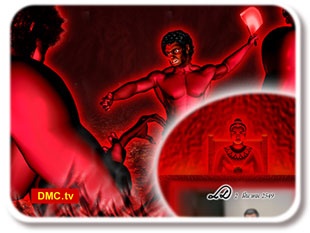
- He is in the circle of being a denizen of hell or being a judge who decides who goes to which level of hell.
- Or he must be the head of the denizens of hell in one zone of hell. To end this cycle, he must focus on making merit when he is born as a human being. Or you must make special merit on his behalf.
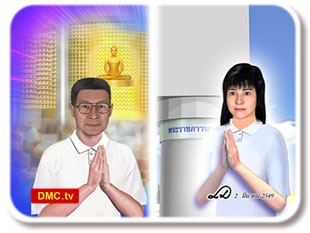
- Performing duties that keep the peace in a country creates merit that counteracts demerit. So he must remain in the cycle just described.
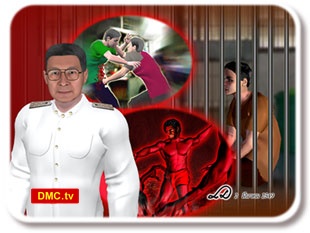
2. In the Law of Kamma, deciding to sentence someone to execution is a violation of the first precept because there is an intention to order the taking of a life. Even if the person sentenced broke the law, it is against the Law of Kamma.
- The person who makes the decision to order the execution accumulates the most demerit. The executioner accumulates the next highest amount of demerit. Then the people who assist with the execution accumulate the next highest level beyond that of the executioner.
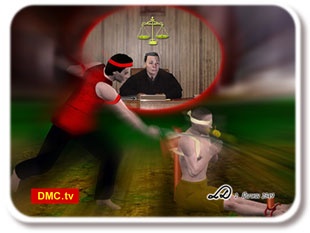
- This demerit makes people have short lives because it is a violation of the first precept against killing. If a person drinks alcohol to calm himself, the demerit from violating the precept against consuming intoxicants will augment the other demerit. This will make the person mute, crazy, or mentally retarded in his next life.
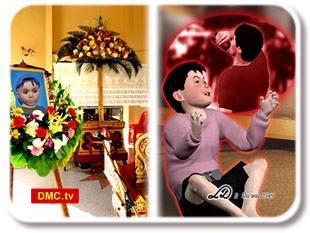
3. A prisoner eats until he is full, listens to monks’ sermons, is asked for forgiveness by his executioners, and forgives his executioners. This will make the executioner’s demerit lighter.
- It is forgiveness that will prevent the accumulation of demerit that connects the prisoner and his executioner. But it will still make the executioner’s next life shorter.
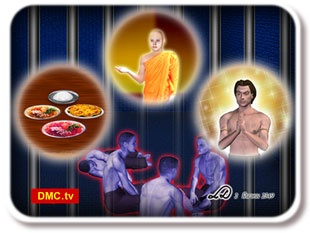
- The prisoner might be able to escape going to hell because his mind is clear before his death.
However, he cannot go to heaven. At best he will become an earth spirit. He has a lot of demerit from bad actions so he is sentenced to execution.
- But if his mind is not clear, he will go to hell.
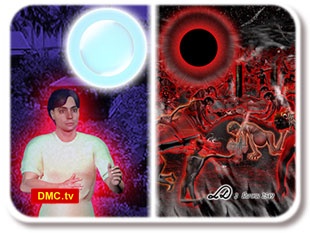
4. A prisoner can be executed by cutting off his head or by injection as done currently. These two methods of execution are different. They use different degrees of effort. Execution by beheading with a sword requires more effort than execution by injection. So execution by beheading will create more demerit.
- When the results of this demerit arise, the executioner will die from a more horrible cause and will have a shorter life.
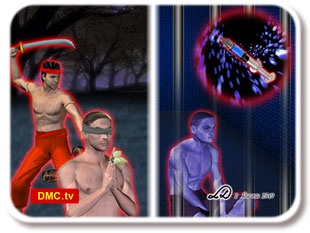
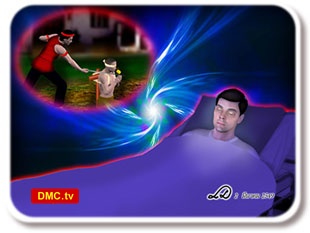
5. Execution by special equipment; for example: 1) placing the person in a basket like a ball and having elephants kick the basket until it runs into a series of iron spikes.
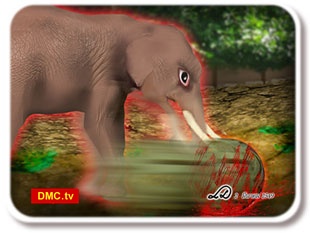
- These people have various kinds of demerit. They may have tortured people using similar methods. Some people’s demerit arises from killing animals for food. The demerit from speaking badly about others can combine with demerit from a person’s present life. For example, the demerit from killing people by torturing them to death combines with the demerit from speaking badly.
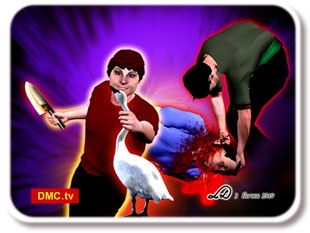
- Impaling a person with a hook through his chin and hoisting him up by this hook until his feet no longer touch the ground.
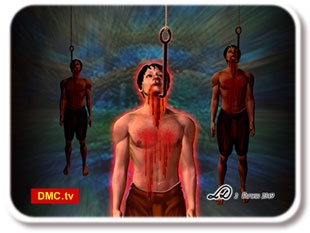
- Such people tortured people or animals in similar ways in the past.This demerit can combine with the demerit from the demerit from speaking hurtfully and making people lose face. This is different from the first type of speaking demerit which makes people feel badly.
- In addition, it comes from the demerit caused by speaking in ways that encourage people to engage in verbal abuse.
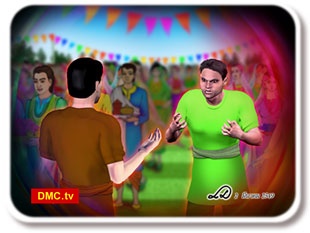
- Placing the person in a coffin and placing the coffin in the hot sun. Such people tortured people or animals in similar ways in the past.
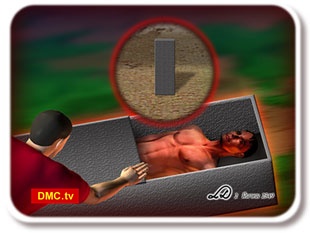
- When he died, he was invited to hell as the head of the denizens of one zone of hell.
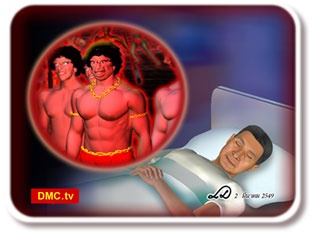
- He received the merit you had on his behalf. This merit will decrease the amount of time he spends in hell.
- He thanks to you for the merit you made on his behalf. He received it.
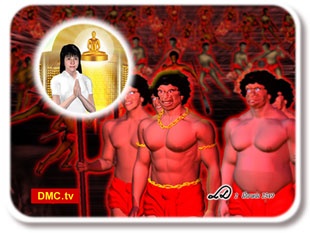
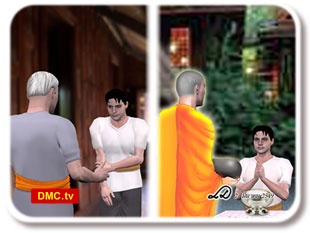
- Your mother had a comfortable life in the palace as a child but later had a difficult life. This is because she did not make offerings consistently in her past.
- When the results of her merit arose, she had a comfortable life. When she did not make merit, this led her to have difficulties.
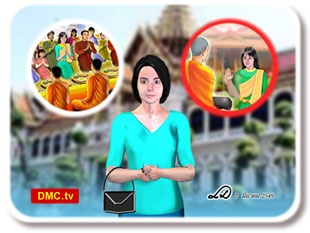
- Both of your parents made merit together for a brief period. This made them be together only briefly. They did not make merit in the same manner. Your father was the leader and your mother followed.
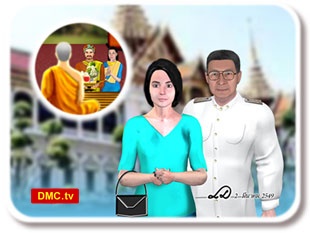
8. Your mother had emphysema because of the demerit from killing animals in her past lives and her most recent life. This combined with the demerit from smoking out animals; for example, by smoking bees out of their hives to get honey. These types of demerit made her have to work in an environment that made her contract this disease.
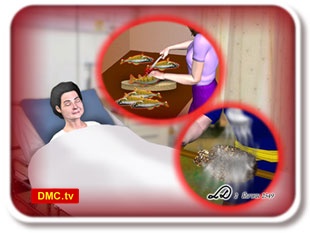
- She became an angel in a golden celestial palace in Tavatimsa (the second level of heaven). But her palace was not very large. So she is in this situation because of the merit she made as a Buddhist.
- The merit she earned from preparing fine cuisine for the Supreme Patriarch led her to have very delicate celestial treasures.
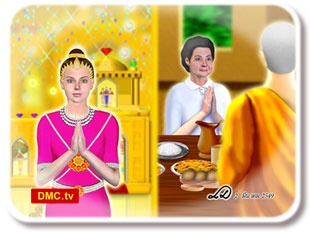
9. The image of the Phra Dhammakaya that appeared in the x-ray was due to the power of the gift amulet. This power appears when our minds are relaxed and clear. Whether you see the image of Luang Pu or Phra Dhammakaya depends on them and on your mental state being relaxed and clear.
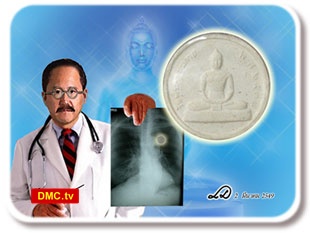
- This merit will help to counteract some parts of his demerit.
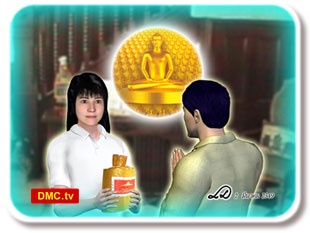
11. When he passed away, his mind was clear enough to avoid going to hell because he followed your advice. But he did not fully do everything you told him. He was unfamiliar with thinking about merit.
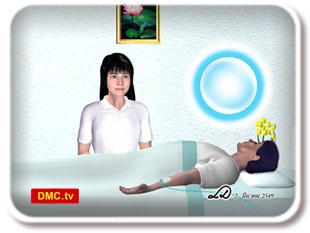
- He became a common earth spirit at the earth spirit village. He received the merit made on his behalf and this improved his situation. But you must make merit on his behalf very often.
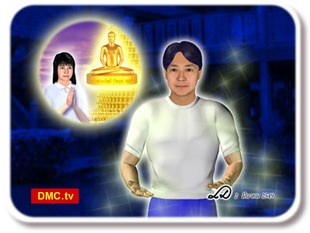
12. Your dream that you saw your brother was true. He came to say goodbye before he left. So he followed some of your advice.
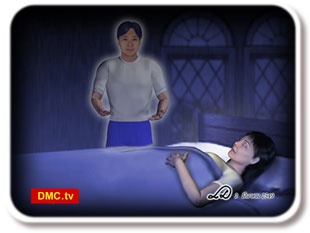
- In this life we meet again and diligently make all forms of merit to the fullest degree. Make the resolution that when you pass away we will all go to Tusita (the fourth level of heaven) together. Let us not miss each other.






